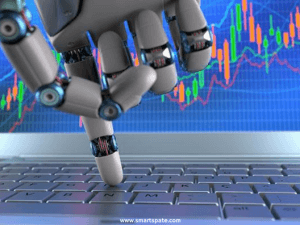AI Captures Wall Street: How Does It Affect On Sphere Of Finance?
Artificial intelligence can turn into a predominant tool for developing financial strategies that were previously considered difficult to predict because traders and hedge fund managers cannot compete with robots that are able to handle huge amounts of data and constantly improve their forecasts by making investment decisions.
In the near future, most of the jobs in the financial markets will be occupied by robots, and this is good news because the best university graduates can now go into industries with more tangible benefits for the population and the planet – technological start-ups, energy, and medicine.
Artificial intelligence and record return on investment
Most world exchanges use computers that make decisions based on algorithms and correct strategies based on new data, but some industries, for example, bond markets, are automating more slowly.
In March, a research team from the University of Erlangen-Nuremberg in Germany developed a number of algorithms that used archival market data to replicate investments in real time.
- One of the models allowed to achieve 73% return on investment annually from 1992 to 2015, taking into account transaction costs. This is comparable to the real market yield of 9% per year. The profit was especially high during the market turmoil of 2000 (545% of profitability) and in 2008 (681% of profitability), which proved the increased efficiency of quantitative algorithms in periods of high volatility when emotions prevail in the markets.
A study by scientists at the University of Erlangen-Nuremberg showed that in their models, the profits from AI investments declined after 2001, as the use of robots in trading on the exchange became more visible and the number of opportunities for using market inefficiency decreased. However, in recent years, profitability has fallen and from time to time even became negative, which researchers attribute to the growing influence of AI on stock trading.
- The idea of using computers for trading stocks is not new. Its counterpart – algorithmic trading or black boxes – has been used for more than ten years and is steadily gaining popularity. In 2012, algorithmic trading accounted for 85% of the market.
If this trend continues, 90% of the trade will be conducted through computer programs. Algorithmic trading today is moving in the direction of high-frequency HFT-trading, in which the shares are bought and sold for a fraction of a second. The algorithm quickly discovers and uses discrepancy, the profit becomes less and less, but the volume of trades is not reduced.
- The January Eurekahedge study of 23 hedge funds using artificial intelligence has shown that they demonstrate much better results than those managed by humans.
Over the past six years, these funds have achieved an annual return of 8.44% compared to conventional funds, whose rates ranged from 1.62% to 2.62%. The authors of the study link the dominance of artificial intelligence in the industry with the fact that it constantly conducts retesting, rather than simply accumulating data. This may also be due to the shortcomings of traditional quantum approaches and the use of trade models built using unprofitable backtests on historical data that are not capable of generating real-time profits.
- Artificial intelligence infinitely processes huge amounts of data, including books, tweets, news, financial indicators and even entertainment TV programs. So he learns to understand global trends and constantly improves his predictions about financial markets.
Hedge funds have long hired mathematicians who develop statistical models and use historical data to create trading algorithms that foresee market opportunities, but artificial intelligence makes it faster and constantly improved.
That is why financial giants such as Goldman Sachs, who launched the Kensho trading platform based on artificial intelligence in 2014, switch to robotic systems that predict market trends and sell significantly better people.
Why artificial intelligence will soon replace people from the exchange
To earn more than the average in the stock market is almost impossible – even the most talented investors on Wall Street do not differ inconstancy. Traders and hedge fund managers do not stand up to competition, but their problem is that they are just people, while all decisions made by robots are based only on data and statistics.

“People are always biased and emotional, regardless of whether they realize it or not,” Babak Hoxat, co-founder of the financial start-up Sentient and one of Siri’s developers at Apple, said in an interview with Bloomberg. – Everyone knows that people make mistakes. In my opinion, it’s much more terrible to rely on guesswork and intuition, and not on data and statistics. “
- Systems like the one developed by Sentient can analyze huge amounts of information including market data, trading volumes, price fluctuations, SEC Internet applications for all companies, social networks, news and videos on YouTube. The goal is to ensure that the algorithm compiles the optimal investment portfolio on the basis of available knowledge and regularly optimizes it based on the expected new data for each month.
The number of similar projects in recent years has increased significantly. According to some estimates, in the financial sphere, the number of companies working with artificial intelligence reaches 1500.
For example, the Medallion fund in Renaissance Technologies, using quantitative methods of stock market analysis, boasts some of the best indicators in the investment history. For 20 years the fund was able to return + 35% in annual terms. This means that if you invested $ 10 thousand in 1997, today you would have already had $ 4.04 million on hand.
- Bridgewater Associates hired a team that would build an autonomous AI system under the leadership of David Ferrucci, who in the past developed for IBM the computer Watson, who won the intellectual quiz show Jeopardy.
Aidyia Limited, an asset manager in Hong Kong, launched a hedge fund fully managed by artificial intelligence. He can read the news in several languages, analyze economic data, identify questionable templates, predict market trends and then invest.
- Some companies use artificial intelligence to ensure profitability through algorithmic trading. Sentiment Technologies Fund, in just a few minutes, can simulate 1800 trading days, pitting trillions of virtual traders among themselves.
A lot of promising hedge funds around the world have long used machine learning for algorithmic trading because this excludes any manifestations of irrational feelings such as fear and greed. Investors want artificial intelligence to tell them how to make money in the stock market.
How it works in practice: AI investment companies
Numeral holds competitions for the creators of trading strategies. Elements of the best strategies are then used by the fund in real trading on the exchange, and their creators are rewarded.
- Qplum uses machine learning to create a robot consultant that uses artificial intelligence algorithms to make investment decisions.
- Sentiment also launched several applications on its artificial intelligence platform. On the development of one of them, associated with algorithmic sales, it was possible to raise $ 135 million. The fund created several trillion robot traders, later joined them and is going to allocate this project to a separate company.
- Alpaca, the company founded in 2013, raised $ 1 million to develop the trading platform Capitalism, which allows you to build stock-based algorithms based on technical analysis, predicting fluctuations in the value of shares. The platform recognizes user templates as “optimistic” and “pessimistic” and builds a trading strategy based on this.
- The French start-up Walnut Algorithms raised $ 446,000 to combine machine training with financial expertise and achieve an absolute return on investment.
- Binatix works with hedge funds that use their own technology for investment strategies.
- Aidyia, a Hong Kong hedge fund that uses “general artificial intelligence” that more accurately mimics the human brain, in 2015 launched a long/short investment fund that trades in US shares and makes all stock transactions without human intervention.
- The Canadian company BUZZ Indexes collects large data from social networks, interprets these data using artificial intelligence, and then determines which stocks will generate returns. Based on this, an index of interest in social media is constructed and 75 most popular shares are determined.
The system analyzes not only Twitter and Facebook, but also more than 50 thematic blogs, sites, and news services. After that, Buzz clears the data and interprets the mood of users by analogy with Aspectiva, which marks all product reviews on the network as positive or negative.
If the machines win: the best “techies” will be more useful
“The widespread introduction of artificial intelligence in the financial industry will lead to the fact that traders with huge salaries will lose jobs due to robots as quickly as factory workers. “Says Mark Minevich, founder of Going Global Ventures and a senior fellow at the US Council on Competitiveness. “The influence of artificial intelligence in the industry is gradually growing, but very soon it will completely change it.”
- According to the research of the company Coalition Development, today the average salary of employees in the 12 largest investment banks reaches $ 500 thousand per year, and many traders earnings equal to several million. For example, in 2015, at least five managers of top hedge funds earned $ 1 billion. The motivation to refuse employees who earn $ 500 an hour and replace them with robots is understandable.
In 2000, Goldman Sachs had 600 traders who bought and sold shares at the direction of the major customers of the bank, today there are only two such employees left, and the rest of the work is done by robots. As soon as the same happens to all other financial companies, it’s a matter of time.
- This trend is likely to transform the industry because the best university graduates will lose interest in Wall Street and will prefer work in medicine, energy, production and other areas beneficial to society. Today about a third of graduates of the top ten business schools in the US are going to work in finance, only 5% go to medicine and even fewer in all other sectors.
If MBA graduates leave Wall Street but stay in New York, it will help him compete with San Francisco and not suffer from a shortage of professionals, which is especially important now that the technology industry may lose the influx of engineers because of the visa restrictions of the new administration President of the United States.
- “All these smart people could hire technology startups, including platforms that develop artificial intelligence,” adds Minevich.
Indeed, when hedge funds lose interest in scientists and engineers, they can join technological start-ups to develop AI platforms, design unmanned vehicles, develop energy technologies, simulate climate change, catch terrorists and seek a cure for cancer, that is, to do things, useful for the masses.





